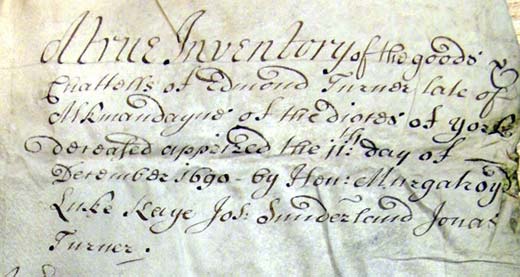History Society Report
The Alan Petford Memorial Lecture 2017 People Puzzles and Earning a Living:
Speaker: Mike Crawford
Monday, 13 February 2017
The work of local historian and educator Alan Petford is still much missed, but his legacy is very much alive in the flowering of seeds planted by him, such as the project to transcribe and make available the wills and other probate documents from the parish of Halifax at the end of the seventeenth century. Mike Crawford has been involved in this project from the start and his talk to the Hebden Bridge Local History Society revealed what a rich resource this is proving to be.

Old documents and original parchment or paper
One thing that became clear was the fascination of working with these old documents, especially when one gets to handle the original parchment or paper. Part of that fascination is the range of puzzles that the transcriber is faced with. After learning to read the elaborate seventeenth century hand and attune to the non-standard spellings there are the obscure technical terms for items in the kitchens, chambers and workshops. Each volume of the wills (5 so far published) contains a glossary specific to that area, revealing extra detail about the furnishing of the houses and the working practices.
Wills, religious beliefs and hidden stories
The wills themselves, while often formulaic in expression, give glimpses of the deeply felt religious beliefs of a time when England was well used to dissent and discord. There are so many feelings that we can recognise, especially the desire to make provision for widows and children and to avoid disagreement among family members as the estate was divided. Occasionally there are hidden stories, such as the man who after settling an income on his wife, left the bulk of his estate to his female servant.
Textiles and agriculture
The comprehensive inventories are an especially rich resource, giving an insight into how people lived as well as how they made a living. Most of the townships were dependent on the dual economy of agriculture and textiles. The agriculture was mainly pastoral with small herds of cows, occasional flocks of sheep and a few pigs being recorded in the inventories. Arable farming – mostly growing oats – was widespread but not economically dominant. However there seemed to be a link between wealth and an investment in textile production. Looms and spinning wheels were not expensive and these inventories document the beginning of an industrial society, with some more wealthy clothmakers employing out-workers. One such man left bequests to each of his spinners or makers of cloth.
Social structure of Calder Valley
The social structure of our part of the Calder Valley seems to have been a fairly flat one with no dominant lord or gentry but many independent yeomen of middling wealth. They lived in some comfort, with furnishings such as beds and cushions tables and longsettles being universal, and some evidence of a more cultured life with books and pictures, silverware, clocks, looking glasses and even virginals making an appearance.
Lending and borrowing before banks
At a time before banking was widely available, the inventories provide ample evidence of a system of lending and borrowing, often involving large amounts and the signing of bonds. The documents point to women (both widows and spinsters) being especially active in money lending. It has been suggested that this availability of local credit enabled the clothiers to invest and expand their businesses. The absence of either a dominant lord or master/employer is borne out in these men with strong self-esteem who valued independence and enterprise: a fertile ground for the industrialisation of the next century.
History in the South Pennines: the Legacy of Alan Petford
Mike’s work in this area will be published in a forthcoming book which celebrates the legacy of Alan Petford, with essays from many of the people and groups he inspired and helped. History in the South Pennines: the Legacy of Alan Petford will be published in the Spring and can be pre-ordered at the History Society's website where you can also find information about the books of Probate Records and forthcoming talks.
Details of all the Society’s activities can be found on the website www.hebdenbridgehistory.org.uk and you can also follow us on our Facebook page.
With thanks to to Sheila Graham for this report
See also


